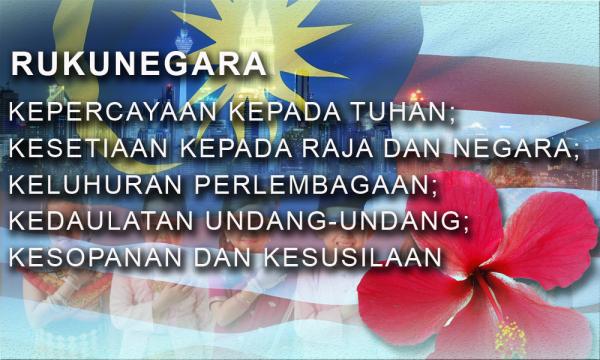I use below the same numbering that Dr Chandra Muzaffar does in his letter dated Feb 18, 2017.
(1) Firstly, in his letter dated Feb 14, 2017 titled ‘Changing Article 153?’ he gave the opinion that “Even after the 1971 Constitutional Amendments which brought Article 153 and other Articles in the Constitution related to Citizenship; etc”
That sentence structure gave the impression that he connected Article 153 with the 1971 amendments.
Thanks to his clarification, I see what he actually meant.
Basis of the nation
As to the rest, it is fairly common knowledge that the concept of Special Position (SP) predates Merdeka.
However, a year earlier, in 1956, the British Monarch and Their Royal Highnesses our nine Rulers jointly appointed the Reid Constitutional Commission (RCC) to set down the principles of a Federal Constitution (FC).
This 1957 FC is the granite bedrock of our nation.
That fact is encapsulated in Article 4(1) which reads, in part, “... and any law passed after Merdeka Day which is inconsistent with this constitution, shall, to the extent of the inconsistency, be void.”
This means Aug 31, 1957 defines the start of an independent, modern Malaya, that led to Malaysia.
(2) In my first letter dated Feb 10, 2017 titled ‘A response to ‘Rukunegara as preamble’’, I believe I had made it abundantly clear where the focus should lie.
For example, I said there:
“We owe this, firstly, to the truly poor and disadvantaged bumiputra because they are being ill-served by a system that has inevitably been corrupted while pretending to defend them.”
Could anything be more transparent?
Yet Dr Chandra keeps harping on the issue of the Chinese and Indian minorities. Why so?
Let me explain my consistent focus.
Issues affecting nation
Significant issues affecting us that emerged in the last decade, include growing polarisation, the low-income trap, thousands of jobless grads, adverse migration patterns, unaffordable home prices reaching 30X annual income or more, depleted oil/gas wealth in future and endemic corruption.
Two-party system
After six decades of independence, the growth of a two-party system has been aborted, again and again, by multiple tactics. Sixty years and we have still not allowed even once the growth of an alternative federal leadership which takes time to find its feet?
Many of the issues listed would be eased by a vigorous two-party democracy and the independence of strong institutions. No coincidence that these exist in almost every first-world, high-income nation.
Political change is imperative if we are not to fairly soon become another sick man of Asia.
Defining economic need to reduce leakages in implementation
Yet it makes no sense to try to do anything which does not serve the majority Malays and East Malaysian Natives. All change in Malaysia begins there.
That is why the hypothetical Model looks at the positive changes, for bumiputras, in better implementation of affirmative action.
Fix this problem first and the rest of the puzzle should fall approximately into place. Fail to fix it and the possibilities to distort implementation remain. Murphy’s Law “whatever can go wrong, will go wrong” will apply.
Affirmative action usurped
A practical social action programme created in 1957, initially produced results until say, 1990 and then had been gradually usurped to serve the needs of fairly small numbers of kleptocrats.
The income gap between the rich and the underserved mass of poor bumiputras, has now widened. The ultra rich with multiple helicopters, private planes and lavish lifestyles here and overseas, remain recipients of affirmative action meant for indigent and disadvantaged bumiputras.
So it seems specious to sketch at length how the New Economic Policy (NEP) was structured to eradicate poverty irrespective of race. That wasn’t my point.
I refer those interested to peruse Professor Kamal Salih’s 2013 UN- commissioned study ‘Human Development Report: Malaysia’ which reveals, inter alia, that intra-ethnic income gaps now exceed inter-ethnic ones.
The report ends with the words : “There are fundamental development pathologies in Malaysia - not just economic but also social and political - which can only be cured by the serious application of political will.” Note the use of the term “development pathologies.”
Anyone seeking change must first consider the plight of the bumiputras, as a prior objective and correct past policies for blind spots.
Consistency between SP and alternative hypothetical model
Finally, it is perfectly consistent to adhere to the SP meant for bumiputras and to address deficiencies in implementation of policies through an alternative hypothetical model. How else does Singapore, as Dr Chandra noted himself, also retain the SP there while creating a rugged, thriving society based on meritocracy with minuscule corruption? Was Lee Kuan Yew’s Singapore inconsistent and changed the goalposts? They achieved first-world status 20 years ago.
(3) I am ready to engage fully in rational discussion but if someone packs his bags and departs, all one can say is farewell and good luck.
It is quite interesting that one’s point of view can be so misrepresented. But this is possibly an election year.
I cannot endorse his group’s initiative. Surely that can’t be the panacea for all the nation’s ills.


